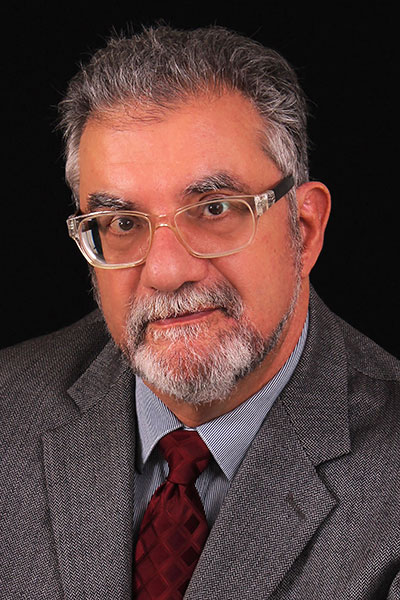An investigator whose work redefined idiopathic pulmonary fibrosis as an epithelial-driven fibrosis and has contributed to the pioneering research identifying the transcriptional signatures that distinguish some of the fibrosing lung diseases will deliver this year’s J. Burns Amberson Lecture.

Moisés Selman, MD, will present “The Importance of Asking the Right Questions to Decipher Unknown Disease Mechanisms” on Sunday, May 19, during the Awards Ceremony, which begins at 4:30 p.m. and will include the Edward Livingston Trudeau Medal and the Distinguished Achievement Award.
“I was first surprised and then deeply excited about receiving this honor and incredibly grateful to the ATS for recognizing my work,” said Dr. Selman, director of the Interstitial Lung Diseases Program at the Instituto Nacional de Enfermedades Respiratorias in Mexico.
He credits the serendipity of two events in the early 1980s with his entry into the field of interstitial lung disease and trusting his gut with pursuing the “right questions” to challenge the idea that IPF is not fibrosis caused by unresolved chronic inflammation.
“There is something intuitive when you are evaluating a concept, and suddenly something tells you that it’s not this way, this situation,” Dr. Selman said. “The question of inflammation was very clear. For 50 years, patients with IPF were treated with anti-inflammatory and immunosuppressive drugs without any success. So, why did other ILDs respond partially or totally to this treatment?”
Within weeks of his arrival to work at what is now the National Institute of Respiratory Diseases in Mexico, two women with slow, progressive respiratory problems were admitted to the hospital there with biopsies indicating non-specified fibrosis.
“No one knew anything about this problem,” Dr. Selman said. “Both progressed and died accepting her destiny — and our ignorance.”
Around this time, Ronald Crystal, MD, published a paper on the clinical and basic concepts of IPF, which piqued Dr. Selman’s interest in collagen. Dr. Crystal’s paper, combined with Dr. Selman’s observations of the two above-mentioned patients, inspired him to dedicate himself to the understanding of ILD.
Yet, despite his dedication to the question he wanted to answer, his colleagues were not immediately convinced.
“Collagen is the big problem in fibrosis, and I began to measure collagen in IPF patients,” Dr. Selman explained. “I always found a high amount of collagen, but Dr. Crystal had published that this is not true, that there is not increased collagen, but there is a change in the type of collagen.”
Dr. Selman, as an early career investigator, submitted a paper for publication detailing the significant amount of collagen seen on slides and from his biochemical analysis in IPF patients.
“It was rejected in 24 hours, telling me if Ronald Crystal said that collagen is not increased, it is not increased,” Dr. Selman said. “But when I pursue something, I persevere. I continued to measure collagen, but I also measured collagen synthesis and collagen degradation.”
With more data to publish, Dr. Selman submitted a new paper to the European journal Thorax. The paper was accepted, and Dr. Selman’s research continued.
In 2001, Dr. Selman, together with Annie Pardo, PhD, and Talmadge King, MD, published a position paper suggesting that IPF is not an inflammatory disease but rather is an epithelial trigger fibrosis, and he continues to watch the understanding and treatment of this disease and other ILDs expand.
“ILD represents a large number of different disorders, and all have evolved differently,” Dr. Selman said. “Most of our concern centered on IPF, a progressive and usually lethal disease. The historical evolution is fascinating from the past century, when most efforts were focused on ILD classification and terminology, until the current century, when the explosive progress in molecular genetics, epigenetics, and multiomics, as well as the development of complex computational tools, resulted in a huge advance in unveiling the pathogenic mechanisms of these diseases, primarily on IPF.”
New technology has hastened further scientific discovery to the benefit of people living with ILD.
“Recent advances in artificial intelligence, machine and deep learning, and artificial neural networks show promising results in identifying lung fibrotic patterns in high-resolution computed tomography or helping to create a tissue genomic classifier for a specific diagnosis,” Dr. Selman said. “Finally, incipient approaches to precision medicine are ongoing in the area of pharmacogenetics.”
Dr. Selman has also focused on the role of aging in lung behavior, studying a large cohort of individuals over 65 years and models of natural and accelerated aging. Based on this research, he and Dr. Pardo, his lifelong companion with whom he has made the most important contributions, coined the term “fibroaging” to describe a pathologic characteristic associated with aging, which was incorporated in the recently published “Hallmarks of Aging.” More recently, he published a provocative proposal suggesting that usual interstitial pneumonia should be considered a stand-alone diagnostic entity.
Dr. Selman has been active in the ATS since joining the Society four decades ago. He authored several “Updates in Interstitial Lung Disease,” published in the American Journal of Respiratory and Critical Care Medicine. He has served on the Board of Directors (1997-1999) and as associate and deputy editor of the AJRCCM. He also has been an active contributor to ATS workshops, consensus statements, and guidelines that have resulted in highly cited publications. He has been an invited speaker, reviewer, and chair of several scientific sessions at ATS International Conferences.
He has served on multiple international working groups, including for the ATS, ERS, and ACCP. He was a founding member of the Latin American Thoracic Association and was president of the Mexican Society of Pulmonology.
Dr. Selman earned his medical degree at the University of Chile and trained in pulmonary medicine at the National Autonomous University of Mexico. After joining the Instituto Nacional de Enfermedades Respiratorias in Mexico, he established the institute’s first Research Branch.
He has published about 300 original papers, reviews, and book chapters. Dr. Selman has achieved several distinctions, including the National Prize in Sciences and the Recognition Award for Scientific Achievement of the ATS. In 2015, he was elected to the Association of American Physicians. Most recently, the Mexican Secretary of Health honored Dr. Selman by naming the research unit of its institute as the Dr. Moises Selman Building of Respiratory Research.
Dr. Selman is passionate about training physician-scientists and has received numerous accolades as an outstanding teacher, mentor, and physician. He established a highly regarded course on interstitial pulmonary diseases at the Faculty of Medicine at the National Autonomous University of Mexico. He is currently a distinguished investigator in its institute.
The Amberson Lecture is named for James Burns Amberson, an international authority on chest disease and tuberculosis. This lecture recognizes major international lifetime contributions to clinical or basic research that have advanced the fundamental understanding of basic, translational, or clinical approaches to respiratory disease, critical illness, or sleep disorders.
Information on the Respiratory Health Awards, including how to make nominations, is available on the conference website.
Don’t Miss ATS 2024 Highlights: On Demand
Don’t forget that ATS 2024 Highlights: On Demand are available to all conference registrants! On Demand will give you access to the Opening Ceremony, Plenary Session, Keynote Series, Clinical Year in Review, Adult Clinical Core Curriculum, and so much more. The topics will cover ILD, asthma, health equity, and CF, to name just a few. On Demand content will be accessible to all ATS 2024 full conference and On Demand registrants until March 2025.
